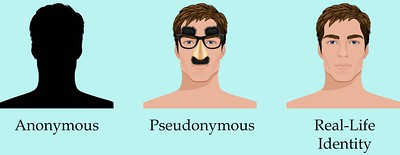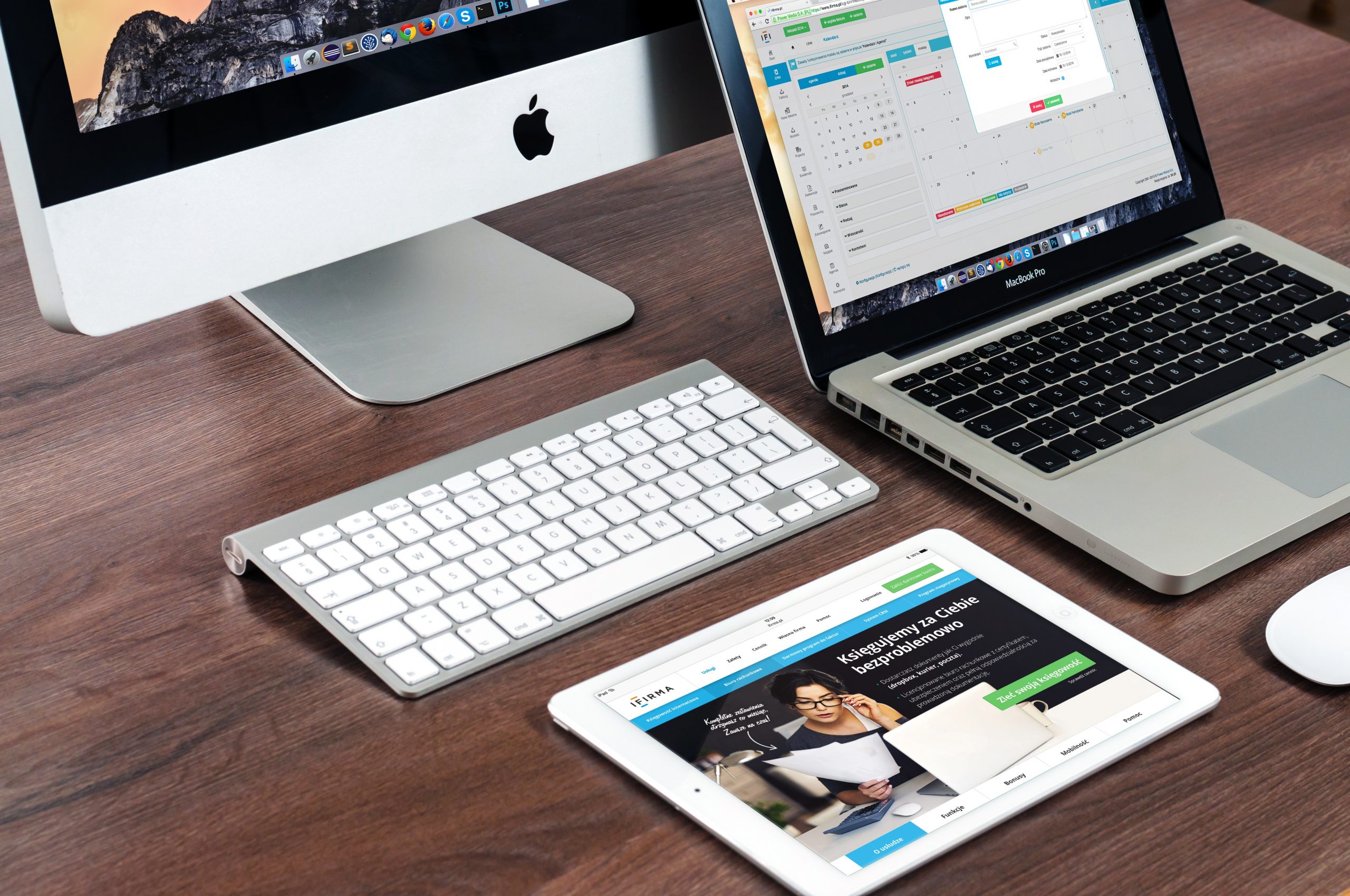Learning Objectives
- Examine Erikson’s theory of identity management.
- Differentiate between online identities.
- Discuss the relationship between new media and the self.
Think about some ways that social media outlets have changed the way you think about yourself and the way you think about and interact in your relationships. Have you ever given your Facebook, Instagram, or TikTok a “once-over” before you send or accept a friend request just to make sure that the content displayed is giving off the desired impression? The technological changes of the past twenty years have affected you and your relationships whether you are a heavy user or not. Even people who don’t engage with technology as much as others are still affected by it since the people they interact with use and are affected by new media to varying degrees
Online Identity
Types of Online Identities

Anonymous Identity
Pseudonymous Identity
Real Life Identity
Media and The Self
The explicit way we become conscious of self-presentation when using new media, social networking sites (SNSs) in particular, may lead to an increase in self-consciousness. You’ll recall we talked about the role that communication plays in helping us meet our identity needs and the role that self-discrepancy theory plays in self-perception. The things that we “like” on social media, the pictures we are tagged in, and the news stories or jokes that we share all come together to create a database of information that new and old friends can access to form and reform impressions of us. Because we know that others are making impressions based on this database of information and because we have control over most of what appears in this database, people may become overfocused on crafting their online presence to the point that they neglect their offline relationships.
This extra level of self-consciousness has also manifested in an increase in self-image and self-esteem issues for some users. For example, cosmetic surgeons have noted an uptick in patients coming in to have facial surgeries or procedures specifically because they don’t like the way their chin looks on the webcam while chatting on Zoom or because they feel self-conscious about the way they look in pictures that are now passed around and stored on new media. Since new media are being increasingly used in professional capacities, some people are also seeking cosmetic surgery or procedures as a way of investing in their personal brand or as a way of giving them an edge in a tight job market (Roy, 2012).
The personal and social nature of new media also creates an openness that isn’t necessarily part of our offline social reality. Some people try to address this problem by creating more than one social media account. People may also have difficulty managing their different commitments, especially if they develop a dependence on or even addiction to new media devices and/or platforms. New media blur the lines between personal and professional in many ways, which can be positive and negative. For example, the constant connection offered by laptops and smartphones increases the expectation that people will continue working from home or while on vacation. At the same time, however, people may use new media for non-work-related purposes while at work, which may help even out the work/life balance. Cyberslacking, which is the non-work-related use of new media while on the job, is seen as a problem in many organizations and workplaces. However, some research shows that the occasional use of new media for personal reasons while at work can have positive effects, as it may relieve boredom, help reduce stress, or lead to greater job satisfaction (Vitak, Crouse, & LaRose, 2011).
Personal media devices bring a sense of constant connectivity that makes us “reachable” nearly all the time and can be comforting or anxiety-inducing. Devices such as smartphones and computers, and platforms such as e-mail, social media, and the web, are within arm’s reach of many people. While this can be convenient and make things more efficient in some cases, it can also create a dependence that we might not be aware of until those connections are broken or become unreliable. You don’t have to look too far to see people buried in their smartphones, tablets, or laptops. While some people have learned to rely on peripheral vision to text and walk at the same time, others aren’t so graceful. In fact, London saw the creation of a “text safe” street with padding on street signs and lamp poles to help prevent injuries when people inevitably bump into them while engrossed in their gadgets’ screens. Additionally, a survey conducted in the United Kingdom found that being away from social networks causes more anxiety than being a user of them. Another study found that 73 percent of people would panic if they lost their smartphones (Fitzgerald, 2012).
In the following video, Poppy Jamie discusses lessons we should all know before we dive into our social media accounts.
Of course, social media can also increase self-esteem or have other social benefits. A survey of fifteen thousand women found that 48 percent of the respondents felt that social media helped them stay in touch with others while also adding a little stress in terms of overstimulation. Forty-two percent didn’t mention the stress of overstimulation and focused more on the positive effects of being in touch with others and the world in general. When asked about how social media affects their social lives, 30 percent of the women felt that increased use of social media helped them be more social offline as well (Kintzer, 2012). Other research supports this finding for both men and women, finding that Facebook can help people with social anxiety feel more confident and socially connected (Ryan & Xenos, 2011).
Whether social media has positive or negative effects on us personally, understanding how media influences us personally is an important discovery.
HOW SOCIAL MEDIA LEADS TO SELF-OBSESSION
Student Content
My 500-Word Story on My Unique Perspective on Social Media
Music: Spirit (Final) by Aritus, CC BY 3.0.
Social media has always had a big impact on my life. Around the age of 11 I was invested in playing the games on Facebook. My mom got to the point where she was so tired of having to log into her Facebook for me to play the games that she allowed me to make my own social media page. This is what started the slope of my life into the social media world. My knowledge on social media is extensive. When I was entering high school Instagram had just become a very popular platform, and having started social media at 11, by 15 I had almost every social media there was. Though this was the age I became invested into making a good instagram. I followed bloggers, who posted their luxurious lives, and I strived to have mine resemble theirs.
This is when I began to develop a knowledge on editing photos. I downloaded an app called FaceTune where I learned the interworking’s of photo editing. I eventually got so good I could completely change the background of the photo and edit out anyone’s insecurities, even items in pictures. I also became invested in the Adobe editing world with an app called Lightroom. The Famous Influencers on Instagram I followed, were selling edit’s to photos that made your feed look a certain way. I was so obsessed with the concept of a color scheme, and all my photo’s looking the same on social media, that the photo’s I posted didn’t even resemble me.
My whole social media, which I had become a pro at creating a whole life in, was a complete sham. I had become so good a using social media, that I wasn’t being my self. I had looked more at how many followers I had gained then the positive things I was doing in life. Social Media can consume a person, once you gain even the slightest bit of knowledge. That is what happened to me. Even before going to college, I had become obsessed with how my outfits looked, how many people commented, and how many likes I got on every photo. I would use my Instagram algorithm to see who was interacting, what the best times to post were, and what type of posts got the most likes. This lead to me having ‘photo shoots’ to get just the right picture, because I had to look perfect on Instagram.
My obsession with Instagram, is what lead me to being insecure about my body and the way I looked. I eventually had to take a step back and see that my knowledge and exposure to social media is what was consuming me. I needed to stop letting my world be revolved around getting a perfect picture, because I wouldn’t enjoy and experience since I was too focused on taking pictures. I really wish that I hadn’t had the exposure to social media that I did because I think I would have been a lot happier with my life if it weren’t for social media’s effect. I hope as I grow older I can start living in the moment and using less social media.
About the Author
Savannah Williams is a Communication Major at the University of Arizona. She is from Scottsdale, Arizona. Williams one day wants to open up her own business in her hometown.
Key Takeaways
- New media has both positive and negative effects on our self-concept and self-esteem.
References
Christofides, E., Amy Muise, and Serge Desmarais, “Hey Mom, What’s on Your Facebook? Comparing Facebook Disclosure and Privacy in Adolescents and Adults,” Social Psychological and Personality Science 3, no. 1 (2012): 51.
Doyle, A., “Top 10 Social Media Dos and Don’ts,” About.com, accessed November 8, 2012, http://jobsearch.about.com/od/onlinecareernetworking/tp/socialmediajobsearch.htm.
Fitzgerald, B., “Social Media Is Causing Anxiety, Study Finds,” Huffington Post, July 11, 2012, accessed November 8, 2012, http://www.huffingtonpost.com/2012/07/10/social-media-anxiety_n_1662224.html.
Gates, A., “For Baby Boomers, the Joys of Facebook,” New York Times, March 19, 2009, accessed November 8, 2012, http://www.nytimes.com/2009/03/22/nyregion/new-jersey/22Rgen.html.
Kintzer, B., “Women Find Social Media Make Them More Social Offline, Too,” Advertising Age, July 9, 2012, accessed November 8, 2012, http://adage.com/article/guest-columnists/women-find-social-media-makes-social-offline/235712.
Richardson, K., and Sue Hessey, “Archiving the Self?: Facebook as Biography of Social and Relational Memory,” Journal of Information, Communication, and Ethics in Society 7, no. 1 (2009): 29.
Roy, J., “Facebook, Skype Give Cosmetic Surgery Industry a Lift,” BetaBeat.com, July 11, 2012, accessed November 8, 2012, http://betabeat.com/2012/07/facebook-skype-plastic-surgery-cosmetic-increase-07112012.
Ryan, T. and Sophia Xenos, “Who Uses Facebook? An Investigation into the Relationship between the Big Five, Shyness, Narcissism, Loneliness, and Facebook Usage,” Computers in Human Behavior 27, no. 5 (2011): 1659.
Vitak, J., Julia Crouse, and Robert LaRose, “Personal Internet Use at Work: Understanding Cyberslacking,” Computers in Human Behavior 27, no. 5 (2011): 1752.
Vitak, J. and Nicole B. Ellison, “‘There’s a Network Out There You Might as Well Tap’: Exploring the Benefits of and Barriers to Exchanging Informational and Support-Based Resources on Facebook,” New Media and Society (in press).
Walther, J. B., Brandon Van Der Heide, Sang-Yeon Kim, David Westerman, and Stephanie Tom Tong, “The Role of Friends’ Appearance and Behavior on Evaluations of Individuals on Facebook: Are We Known by the Company We Keep?” Human Communication Research 34 (2008): 29.
12.3: Taking the Self Online is shared under a CC BY-NC-SA 4.0 license and was authored, remixed, and/or curated by Jason S. Wrench, Narissra M. Punyanunt-Carter & Katherine S. Thweatt (OpenSUNY) via source content that was edited to the style and standards of the LibreTexts platform; a detailed edit history is available upon request.


